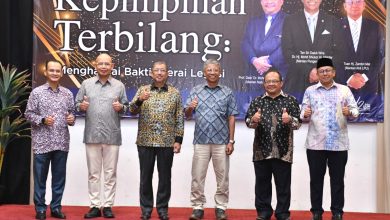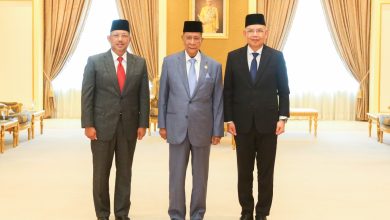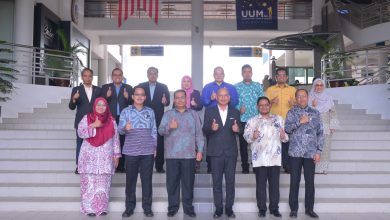Malaysia and China Mark 50 Years of Strong Ties and Collaboration
KUALA LUMPUR: The 50-year relationship between Malaysia and China marks a significant milestone in the development of friendship and close cooperation between the two nations.
To celebrate the 50 years of Malaysia-China relations, the Othman Yeop Abdullah Graduate School of Business (OYAGSB), Universiti Utara Malaysia (UUM) hosted a forum to discuss the significance of Malaysia-China relations.
In his keynote address, the Minister of Higher Education, Dato’ Seri Dr Zambry Abd Kadir emphasised the significance of the programme organised by OYAGSB, which focused on the longstanding relations between Malaysia and China. He noted that this relation is very historic, dating back to 1974 when then-Prime Minister Tun Abdul Razak embarked on a visit that marked a pivotal moment when the world was facing the Cold War.
According to him, the forum aimed to provide valuable insights to the community, emphasising the importance of a 50-year relationship, especially in the field of trade, with China being one of Malaysia’s foremost trading partners.
He said, during the conflict in the western world involving the Union of Soviet Socialist Republics (USSR) or the Soviet Union and its allies, there existed a lengthy ideological war.
“At the time, China emerged with notable economic and technological prowess, with potentially military capabilities as well.”
“The current power landscape is shaped by a multitude of influences, not just one side. The world is not against ideology, it is the geopolitics and geoeconomics that shape our global landscape,” he said while officiating the forum.
Dr Zambry said that Malaysia’s relationship with the United States has a long history in terms of trade, while its relationship with China has been ongoing for 50 years.
According to him, the government aims to foster relations with all nations rooted in friendship, striving to avoid hostility towards any party by maintaining a neutral policy and a balanced political stance.
He said, Malaysia seized the opportunity to build strong relations with China based on mutual respect.
Meanwhile, the Vice-Chancellor, Prof. Dato’ Dr Mohd Foad Sakdan expressed hope that the forum would offer an extensive array of ideas and views, ultimately enriching the experience for all participants.
According to him, the forum aimed to engage in discussions regarding the future of diplomatic relations between the two nations, and expressed confidence that it would lead to further opportunities to enhance strategic ties between the two parties.
“I am hopeful that this forum will foster greater collaboration, particularly in the fields of education, economy and culture,” he said.
The forum, commemorating 50 years of Malaysia-China Relations, was moderated by the Deputy Vice-Chancellor (Academic and International), Prof. Dr Mohd Azizuddin Mohd Sani, who engaged in thoughtful discussion on the ongoing cooperation and potential that exists between Malaysia and China.
Three panellists were invited, namely the former Chair of Malay Studies, Beijing Foreign Studies University (BFSU), Datuk Seri Prof. Emeritus Dr Awang Sariyan; Chief Executive Officer of Technology Park Malaysia (TiPM)/MRANTI, Datuk Dr Rais Hussin Mohamed Ariff and Senior Lecturer at the Institute of China Studies, University of Malaya, Dr Ling Tek Soon.
Dr Awang examined the evolution of diplomatic relations between Malaysia and China through the perspective of civilization, tracing the early history of Malay-Chinese relations and how these relations have elevated the status of the Malay language.
Meanwhile, Dr Rais focused on the technological, economic and geopolitical issues between Malaysia and China, emphasising the pivotal role of innovation in the Malaysia-China relations.
Dr Ling highlighted the significance of the economic relationships between Malaysia and China, particularly highlighting the impact of Chinese investment in Malaysia.
In conclusion, this forum underscored the political importance of Malaysia-China relations through a political lens and the potential for China to remain a valuable ally. It highlighted the need for innovation in the relationship, investment opportunities, and employment opportunities available to Malaysians, as well as the overall benefits of knowledge transfer to benefit the higher education institutions in Malaysia.
The forum continued with a question-and-answer session featuring the panellists, moderator and participants. It also included the launch of several books published by UUM Press, namely the 21st Century Islamic Education Curriculum Evaluation Model Based on the Malaysian Teacher Standard Model, Innovative Teaching Practices in STEM Learning, Introduction to International Law, Corruption and Integrity: Peeling Selected Lenses and Transformation of Library Services Through Six Sigma Practices.




